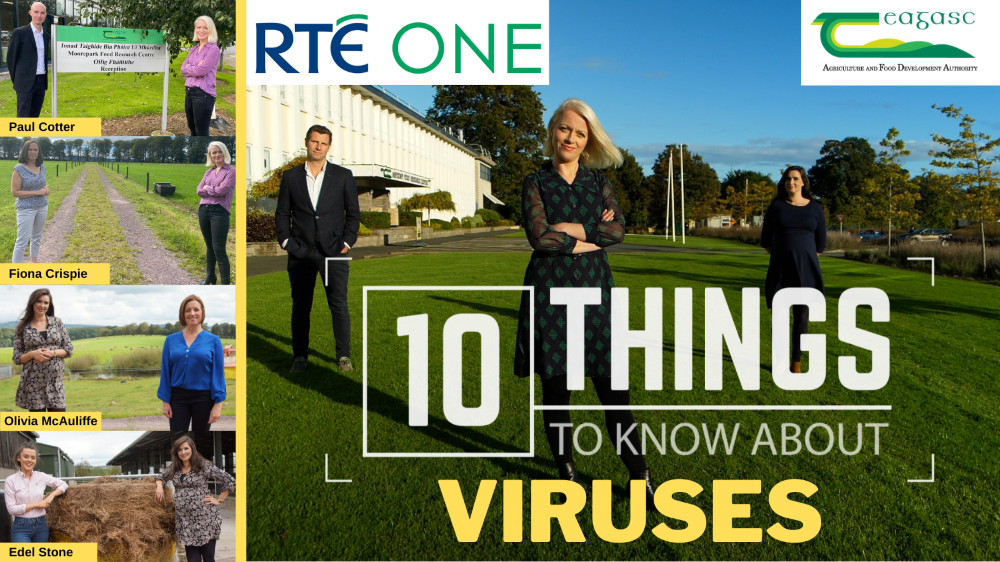14 December 2020
10 Things to Know About … Viruses
2020 will be remembered as the year of the Covid-19 pandemic. As the world continues to fight the spread of the novel coronavirus, Irish scientists are playing a key role by sequencing and identifying changes in its genome. However, there is another more abundant type of virus which can be used to our benefit in food and medicine. Meet the Teagasc researchers tackling the good and bad of viruses on 10 Things to Know About … Viruses, tonight (Monday 14th December) on RTÉ One at 8.30PM.

10 Things to Know About … Viruses
It is less than a year since the World Health Organisation declared the outbreak of Covid-19 a global pandemic and scientists around the world have been leading the fightback against this deadly virus. In this episode of 10 Things to Know About … Viruses, presenter Kathriona Devereux meets Professor Paul Cotter and Dr Fiona Crispie of Teagasc, who are leading the Irish Coronavirus Sequencing Consortium. This consortium, which is funded by Science Foundation Ireland, are sequencing the genome of SARS-CoV-2, the coronavirus that causes COVID-19.
Fiona Crispie explains: “The virus that causes COVID-19 is called SARS-CoV-2. It contains genetic information that can change, also known as mutate, over time. These changes, or mutations, can, among other things, be used as a barcode to ‘trace’ the virus. The Irish Coronavirus Sequencing Consortium consists of a group of scientists based throughout the country who are looking at the genetic makeup of the SARS-CoV-2 strains that are circulating in Ireland using DNA sequencing. Through this approach, we are getting a valuable insight into the routes of entry of the virus into the country as well as how it has circulated within the country subsequently. This information will also support efforts to respond to clusters of infections as they arise, and minimise the spread of the virus. Collecting the sequences (genetic information) of the viruses in Ireland will also mean we can record important new changes that could affect the ability of the virus to cause disease or the efficacy of treatments or vaccines.”
Also in this episode, Aoibhinn Ní Shúilleabháin meets Teagasc’s Dr Olivia McAuliffe and Edel Stone to learn about bacteriophages, the world’s most abundant viruses. Bacteriophages are viruses that infect bacteria only, they are completely harmless to humans and they could be of huge benefit to humankind in a variety of fields including food processing, tackling infection and even in the fight against antimicrobial resistance.
Olivia McAuliffe explains: “Bacteriophages can act to target and kill disease-causing bacteria, just as antibiotics do. However, one thing that makes bacteriophages attractive in the treatment of bacterial infection is their specificity. They can be used with precision, only knocking out the invading bacterial species and leaving the remainder of the bacterial population intact. In this era of antibiotic resistance, when more and more harmful bacteria are developing resistance to our commonly-used antibiotics, fighting bacteria with bacteriophages is a promising strategy.”
Finally in this episode, Jonathan McCrea learns about the world-leading TILDA ageing study which is ideally positioned to examine and better understand the impact of the pandemic and lockdown measures on older people.
The promo video link from 10 Things can be viewed here: https://twitter.com/10Things_ToKnow/status/1337041990022811648
